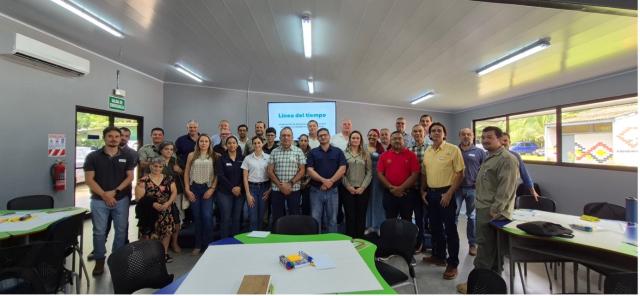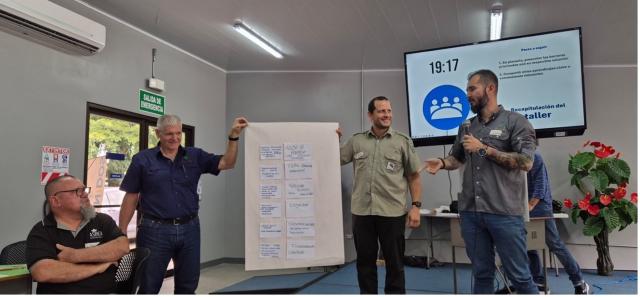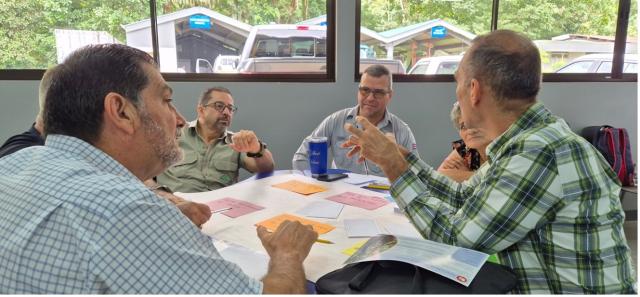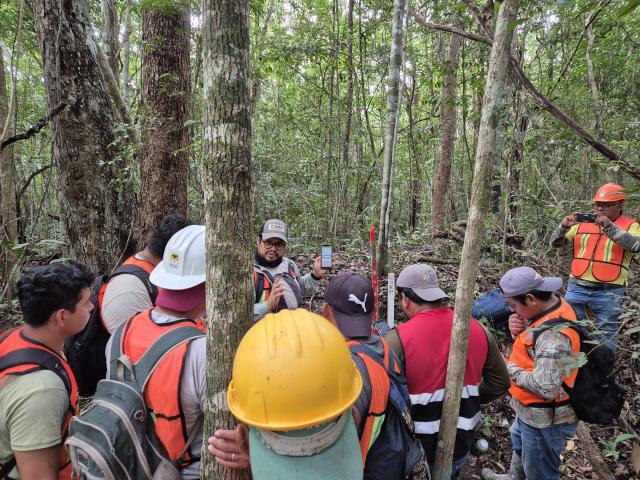Advancing competitive polycyclical forest management in Costa Rica
Latin America and the Caribbean 01.09.2025 Project

As part of the Support for sustainable forest management project, a key milestone was reached with the successful organisation of the workshop "Exploration of obstacles and solutions to position polycyclical forest management", held on 30 July 2025 in San Carlos, Costa Rica. Bringing together a diverse range of stakeholders from the forestry sector, the event contributed to consolidating a shared vision for the future of polycyclical forest management—a strategy that balances ecological preservation with responsible resource use—in the Northern Region of Costa Rica. It also helped define concrete lines of action to enhance the competitiveness, sustainability and governance of the forestry sector.
A workshop to reflect on key topics
The "Exploration of obstacles and solutions to position polycyclical forest management" workshop, led by LuxDev, brought together a diverse group of stakeholders from the forestry sector: forest owners, operators, processing companies, entrepreneurs, public authorities, trade associations, forest regents and financing institutions. Together, they reflected on the challenges and co-created solutions to strengthen polycyclical forest management as a sustainable, competitive, and inclusive alternative for current practices.
The participants discussed several key topics, such as:
- regulatory simplification and administrative efficiency: opportunities were identified to streamline forestry procedures through regulatory harmonisation, improved institutional coordination and a stronger role for forest regents as technical advisors;
- business formalisation and ethical practices: participants proposed strengthening oversight and promoting a culture of ethical business practices, supported by awareness campaigns and training to build trust in legal and sustainable forest products;
- human capital development: the need for comprehensive training programmes was emphasised—targeting regents, technicians, entrepreneurs, and producers—to close technical and technological gaps and integrate business, forestry and marketing skills;
- traceability and market access: traceability was recognised as a strategic tool to enhance formality and open access to high-value markets, leveraging digital technologies integrated with official databases;
- reliable information for decision-making: the creation of integrated forest information systems was encouraged to improve data access, foster collaboration and support evidence-based planning and policy-making.
This collaborative space helped consolidate a shared vision for the future of polycyclical forest management in the Northern Region of Costa Rica. It also defined concrete lines of action to enhance the competitiveness, sustainability and governance of the forestry sector—reaffirming the inter-institutional commitment to rural development and a resilient green economy.
Gallery viewer
What is polycyclical forest management?
As part of the project’s commitment to sustainable forestry in Costa Rica, LuxDev is promoting polycyclical forest management—a strategy that balances ecological preservation with responsible resource use.
Unlike traditional forest management models that rely on single cycles of harvesting and regeneration, the polycyclical approach involves multiple, staggered interventions over time and space. This method allows forests to continue fulfilling their ecological functions while enabling sustainable economic activity.
This approach is characterised by:
- selective harvesting over time: trees are extracted in smaller quantities at different intervals, avoiding large-scale clear-cutting;
- promotion of natural regeneration: between each cycle, the forest is allowed to regenerate naturally, maintaining its vitality and resilience;
- preservation of ecological structure and diversity: the forest’s biodiversity and ecological integrity are maintained, supporting long-term ecosystem health;
- continuous production of environmental goods and services: in addition to timber, the forest continues to provide essential services such as water regulation, carbon sequestration and habitat for biodiversity.
Polycyclical forest management supports a sustainable and competitive forestry sector, aligned with Costa Rica’s environmental goals and rural development priorities. It ensures that forest resources are used responsibly while preserving the natural capital for future generations.
About the project
The Support for sustainable forest management project is funded by the Grand Duchy of Luxembourg and implemented by LuxDev, the Luxembourg Development Cooperation Agency.
Explore more
Discover the latest news from LuxDev and stay updated on the progress of cooperation projects and programmes implemented by the Agency.
All news-

Laos 27.02.2026
When minutes matter: strengthening cardiac emergency response in Lao PDR through advanced cardiovascular life support training
When minutes matter: strengthening cardiac emergency response in Lao PDR through advanced cardiovascular life support training -

Laos 27.02.2026
Khammouane Provincial Hospital launches laparoscopic gynaecological surgery
Khammouane Provincial Hospital launches laparoscopic gynaecological surgery


